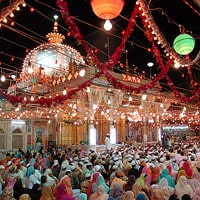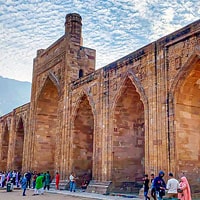Ajmer Sharif Dargah
could-see attraction
26°27'22.3"N 74°37'41.2"E
Muslim pilgrimage site
could-see attraction
Visit duration: People typically spend up to 1 day here



could-see attraction
26°27'22.3"N 74°37'41.2"E

could-see attraction
26°27'18.9"N 74°37'30.5"E
Ajmer, previously known as Ajayameru which means invincible hills, is settled in the heart of Rajasthan. It is among the oldest cities in India. Ajmer is a famous pilgrimage place for Muslims. The city, enclosed by the Aravalli Mountains and Ana Sagar, a wide lake, is one of the heritage cities in India.
Ajmer houses a significant Islamic pilgrimage site, the tomb (or Dargah) of Moinuddin Chishti, who established the Chishtiya or the prime Sufi order in India.
The city not only showcases stellar Islamic architecture but also shares its place with Jain temples proclaiming that it is more than just the land of Rajputs. Ajmer is home to diverse cultures and traditions.
The government of India has categorised Ajmer with the National Heritage City Development and Augmentation Yojana and Smart City Mission schemes.

Ajmer has a rich history and the influence of the kings belonging to different religions is clearly seen through the city’s architecture, food, traditions and beliefs.
Ajaydeva, an 11th-century king belonging to the Chahamana dynasty, founded Ajmer and called it Ajaymeru. The Mamluks of Delhi Sultanate annexed the city in 1193 however it was returned to the Rajputs, the royal of Rajasthan. The Rajputs used the city as a military base.
Mughal Emperor Akbar conquered the city and made it the capital of Ajmer Subah, one of the twelve provinces. The Mughals made pilgrimages to the dargah of Moinuddin Chishti and also enriched the city with architecture like Akbar's Palace and Ana Sagar.
The Scindias, a Hindu-Maratha dynasty, conquered the city in the 18th century. However, by 1818 the British annexed the city and used it as the base of the Ajmer-Merwara Province and owned a Central Jail. It also served as the headquarters of a Railway Volunteer corps.
Ajmer was a separate state till 1956 when Fazil Ali accepted the merger and became a part of Rajasthan.

Offering a wide range of delicacies from around the world, the city of pilgrimage consists of numerous eateries and restaurants to satisfy the hungry heart.
The restaurant located in Nagina Bagh stays open from 8:00 am to 11:00 pm. Ambrosia Restaurant is a pocket-friendly restaurant with cuisine ranging from Indian to Asian to International and includes Halal menus. The dishes are also gluten-free vegetarian and vegan friendly. It provides outdoor seating.

The restaurant is open from 7:00 am to 11:00 pm in the Royal Melange Hotel on Jaipur Road. The menu includes Indian, Chinese, Asian and Fast Food cuisine. TRM restaurant is pocket-friendly and offers vegetarian and vegan dishes and gluten-free options. The eatery offers spacious interior seating along with the buffet.

The eatery offers the best desserts in Ajmer. It is situated opposite Swami Complex which opens at 9:00 am and closes at 11:00 pm. Along with dessert, Mango Masala Restaurant also offers Indian and Asian cuisine and Pizza delicacies. The dishes are also vegetarian and vegan-friendly. The seating arrangements include table services, television and highchairs.

Ajmer is located 20 minutes by car from Pushkar. Ajmer is situated approximately halfway between Jaipur (2.5-hour drive) and Jodhpur (3.5-hour drive).
See location on Google Maps
The city is full of historical edifices and you can complete a tour in one day or you can take your time and add another day.
Exclusive jewellery with traditional designs and colourful clothes reflecting the ancient culture of Rajasthan are perfect souvenirs to shop from the intriguing shops.
The city gets in a festive mood and gets crowded during the Islamic religion days and the Urs festival or the death anniversaries of the saints. It is worthwhile to visit the city on festive days.

